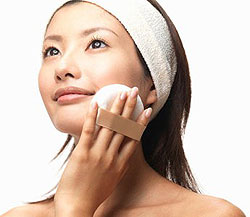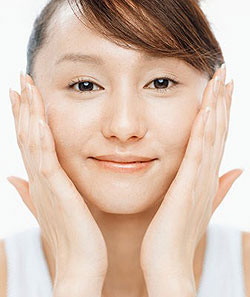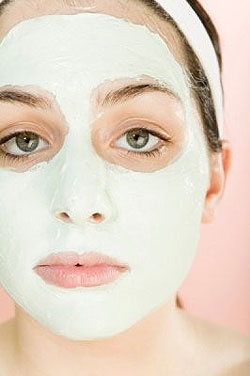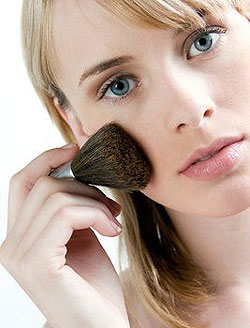|
|
Learning more about Facials
 Generally speaking, a
facial is a popular
spa cosmetic treatment. Though
there are numerous types of facials, the common thread is that all involve some
form of steaming,
exfoliation, extraction and purification. On average,
facial
sessions last either a half hour or an hour. Generally speaking, a
facial is a popular
spa cosmetic treatment. Though
there are numerous types of facials, the common thread is that all involve some
form of steaming,
exfoliation, extraction and purification. On average,
facial
sessions last either a half hour or an hour.
Do facials work? If you enjoy them they do. Taking an hour out for yourself
is one of life's luxuries and a professional facial is so relaxing your
face is
bound to look better afterward. A facial is a great way to treat your
skin.
The Benefits of a Facial
A facial can offer many benefits. The face is always subject to the elements
such as the sun, maybe smoke or an improper at home regime. Facials offer you
the opportunity to work with a professional skin care specialist who will
analyze your skin, help you improve your
complexion and show you how to take
proper care of your skin.
A facial can give you a deep
cleansing, deeper than the cleansing you will get
at home. A facial includes cleansing
 as well as exfoliation which can help to
unclog your pores. Extracting open comedones will also help rid the skin of
acne. Your skin care specialist will help soften the skin with steam, hot moist
towels, and enzymes or other exfoliants. as well as exfoliation which can help to
unclog your pores. Extracting open comedones will also help rid the skin of
acne. Your skin care specialist will help soften the skin with steam, hot moist
towels, and enzymes or other exfoliants.
Massage helps the lymphatic glands to clear off swelling and puffiness However,
the afterglow is short term as it is due to a temporary blood circulation boost.
The effects of a firming facial, which uses electrical currents to stimulate the
skin, last only a matter of hours � days at most. And if you have very greasy,
acne-prone skin, try avoiding stimulating facials completely as they can
aggravate sebaceous glands.
Professional beauty therapists argue that treating yourself to a facial is
extremely worthwhile as it is usually the beginning of a better relationship
with your skin.
What Happens during a Facial?
A classic facial includes cleansing, exfoliation,
massage,
mask,
toning and
moisturizing. Usually, a treatment lasts about 60 to 90 minutes, including time
to relax while the mask takes effect � say, 10 to15 minutes. Some treatments are
entirely manual, others use electronic massage equipment to stimulate facial
muscles. Purists hold that fingers are most sensitive and therefore efficient;
modernist assert that machines have a deeper stimulating action. Before you
select a particular type of facial the beauty therapists must conduct a detailed
consultation concerning your
health,
diet and lifestyle.
Types of Facial
 Basic Facial. These involve manual massage with a variety of skin-care products.
Some may also include mini
hand, shoulder or foot massages. Basic Facial. These involve manual massage with a variety of skin-care products.
Some may also include mini
hand, shoulder or foot massages.
Aromatherapy Facials. These involve essential oils or products manufactured from
them. Essential oils are said to have an affinity with the skin�s natural oils
and can be used to supplement or regulate sebaceous output. Therapists often use
pressure point massage to encourage their efficacy.
Oils are also used to
stimulate and relax.
Electronic Facials. Electrotherapy is said to enhance the action of skin-care
products. The best-known electrotherapy method is called Cathiodermie and was
established in the 1960s. It involves two types of low-voltage current being
applied with tiny fork-like electrodes. Galvanic current ionizes both skin and
gels, improving absorption. High-frequency faradic current massages the skin's
surface, boosting circulation and producing anti-bacterial ozone.
Non-surgical face lift. Controversial � and hugely popular � these high-tech
treatments use electronic massage techniques to boost both muscle and tissue
tone. Electric micro currents compatible with the body's own stimulate the 30
muscles of the face. They also ease fine lines, and boost the circulation and
lymph. However, to keep muscles "exercised", treatments, which are expensive,
must be regular.
Steps for a weekly facial treatment
 For a basic home facial you can do yourself, simply follow these simple steps: For a basic home facial you can do yourself, simply follow these simple steps:
-
Cleanse with cream or foam, massaging the face with circular movements. Rinse
with tepid water and a soft sponge. Blot the skin damp, not dry.
-
Exfoliate using a gentle granular or latex-based "gommage", concentrating on
problem zones. Rinse and pat dry.
-
Massage with a nourishing oil or cream.
-
Apply a mask directly over your moisturized skin, to encourage the cream to
penetrate further. Soak cotton pads in
eye make-up remover, or use cold camomile
tea bags, and place over the eyelids. Relax for 10 minutes.
-
Remove mask and apply
toner.
-
Moisturize with your regular day or night formula.
The following elements seem to be universal regarding a facial: use of
Earth-friendly, healthy ingredients; emphasis on hydration and oxidation; and
commitment to provide clients' with relaxed, glowing
skin.
Related Links
|
|
|
|
|









